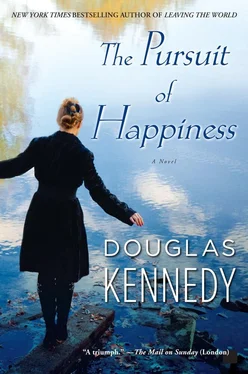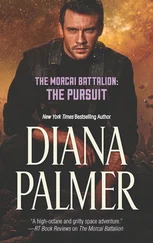'I am not having any daughter of mine living by herself in that venal, indecent city', my father pronounced.
'New York is hardly indecent - and Life isn't exactly Confidential', I said, mentioning a well-known scandal sheet of the time. 'Anyway I thought you'd be thrilled with my news. Life only accepts ten trainees a year. It's an incredibly prestigious offer'.
'Father's still right', my mother said. 'New York is no place for a young woman without family'.
'Eric's not family?'
'Your brother is not the most moral of men', my father said.
'And what does that mean?' I said angrily.
My father was suddenly flustered, but he covered up his embarrassment by saying, 'It doesn't matter what it means. What matters is the simple fact that I will not permit you to live in Manhattan'.
'I am twenty-two years old, Father'.
'That's not the issue'.
'You have no legal right to tell me what I can or cannot do'.
'Don't hector your father', my mother said. 'And I must tell you that you are making a dreadful mistake by not marrying Horace'.
'I knew you'd say that'.
'Horace is a splendid young man', my father said.
'Horace is a very nice young man - with a very nice, dull future ahead of him'.
'You are being arrogant', he said.
'No - just accurate. Because I will not be pushed into a life I don't want'.
'I am not pushing you into any life...' my father said.
'By forbidding me from going to New York, you are stopping me from taking control of my own destiny'.
'Your destiny!' my father said, with cruel irony. 'You actually think you have a destiny! What bad novels have you been reading at Bryn Mawr?'
I stormed out of the room. I ran upstairs and fell on the bed, sobbing. Neither of my parents came up to comfort me. Nor did I expect them to. That wasn't their style. They both had a very Old Testament view of parenthood. Father was our household's version of The Almighty - and once He had spoken, all argument was silenced. So, for the rest of the weekend, the subject wasn't raised again. Instead, we made strained conversation about the recent Japanese activity in the Pacific - and I stayed button-lipped when Father went into one of his jeremiads about FDR. On Sunday he drove me to the train station. When we arrived there he patted my arm.
'Sara, dear - I really don't like fighting with you. Though we are disappointed that you won't be marrying Horace, we do respect your decision. And if you really are that keen on journalism, I do have several contacts on the Hartford Courant. I don't think it would be too difficult to find you something there...'
'I am accepting the job offer at Life, Father'.
He actually turned white - something Father never did.
'If you do accept that job, I will have no choice but to cut you off'.
'That will be your loss'.
And I left the car.
I felt shaky all the way to New York - and more than a little scared. After all, I had directly defied my father - something I had never attempted before. Though I was trying to be dauntless and self-confident, I was suddenly terrified of the thought that I might just lose my parents. Just as I was also terrified by the thought that - if I heeded Father's wish - I would end up writing the 'Church Notes' column in the Hartford Courant, and ruing the fact that I had allowed my parents to force me into a small life.
And yes, I did believe I had a destiny. I know that probably sounds vainglorious and absurdly romantic... but at this early juncture in so-called adult life, I had reached one simple conclusion about the future: it had possibilities... but only if you allowed yourself the chance to explore those possibilities. However, most of my contemporaries were falling into line, doing what was expected of them. At least fifty per cent of my class at Bryn Mawr had weddings planned for the summer after they graduated. All those boys trickling home from the war were, by and large, just thinking about getting jobs, settling down. Here we were - the generation who was about to inherit all that postwar plenty, who (compared to our parents) had infinite opportunities. But instead of running with those opportunities, what did most of us do? We became good company men, good housewives, good consumers. We narrowed our horizons, and trapped ourselves into small lives.
Of course, I only realized all this years later (hindsight always gives you perfect vision, doesn't it?). Back in the spring of '45, however, all that concerned me was doing something interesting with my life - which essentially meant not marrying Horace Cowett, and definitely taking that job at Life. But by the time I reached Penn Station after that horrible weekend with my parents, I had lost my nerve. Despite four years away at college, Father still loomed large in my life. I still desperately sought his approval, even though I knew it was impossible to receive it. And I did think he really would carry out his threat to disinherit me if I went to New York. How could I live without my parents?
'Oh, please', Eric said when I related this fear to him. 'Father wouldn't dare cut you off. He dotes on you'.
'No, he doesn't...'
'Believe me, the old fool feels he must play the stern Victorian paterfamilias - but, at heart, he's a scared sixty-four-year-old who's about to be put out to pasture by his company next year, and is terrified of the horrors of retirement. So do you really think he's going to slam the door on his only beloved daughter?'
We were sitting in the cocktail lounge of the Hotel Pennsylvania, opposite Penn Station. Eric had arranged to meet me off the train from Hartford that Sunday afternoon (I had a two-hour wait for my connection back to Bryn Mawr, via Philadelphia). As soon as I saw him on the platform, I threw myself against his shoulder and started to weep, simultaneously hating myself for behaving so weakly. Eric held me until I calmed down, then said, 'So, did you have fun at home?'
I had to laugh. 'It was wonderful', I said.
'I can tell. The Pennsylvania's nearby. And the bartender there makes a mean Manhattan'.
That was the understatement of the decade. After two of those Manhattans, I felt like I was under anaesthetic - which, I must admit, isn't a bad thing to feel on occasion. Eric tried to get a third drink into me - but I dug in my heels and insisted on a ginger ale. I didn't want to say anything, but I was a little concerned when my brother downed his third Manhattan in four fast gulps, then called for another. Though we'd been in regular contact by letter (long-distance calls - even from New York to Pennsylvania - were expensive back then), I hadn't seen him since Christmas. And I was genuinely taken aback by his physical state. His lanky frame had thickened. His complexion was pasty. A small, but noticeable roll of fat hung beneath his chin. He was chain-smoking Chesterfields and coughing loudly. He was only twenty-eight, but he was beginning to have that puffy look of a man who had been prematurely aged by disappointment. Of course his conversation was as fizzy and funny as ever, but I could tell that he was worried about work. I knew from his letters that his new play (something about a migrant worker revolt in southwest Texas) had just been rejected by every possible theater company in New York, and he was paying the rent by reading unsolicited scripts for the Theater Guild ('It's pretty depressing work', he wrote me in March, 'because it's all about saying no to other writers. But it's $30 a week - which just about pays my bills'). And when he threw back his fourth Manhattan in five gulps, I decided to stop being silent about his chain-drinking.
'One more of those Manhattans, and you'll stand up on the table to sing "Yankee Doodle Dandy"'.
'Now you're being a puritan, S. After I see you off to beautiful Philadelphia, I shall take the subway back to my Sullivan Street atelier and write until sunrise. Believe me, five Manhattans is nothing more than creative lubrication'.
Читать дальше












